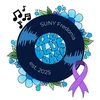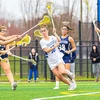SUNY Fredonia’s first cohort of Journalism majors began in Fall 2009 – a fact that surprises many, due to the campus’ history of producing generations of top-notch media professionals.
All across the U.S., you’ll find them: writers, editors, reporters, bloggers, DJs, anchors, photographers, videographers, news directors, production engineers and sales/marketing professionals. However, none of them left Fredonia with a formal journalism degree. Instead, alumni – English, Communication and Philosophy majors, among others – have used their liberal arts education to succeed in this rewarding field.
The new Journalism program has had instant success, with 50 students comprising that initial cohort. Students cite the variety of on-campus media available for hands-on experience, from the rich histories of The Leader, WNYF-TV and Fredonia Radio Systems, to the new “Raphy Report” news briefs, as resources that are giving them critical skills and networking opportunities outside of the classroom. Lead professor and former Buffalo News reporter Elmer Ploetz is also credited for bringing enthusiasm and expertise to the new program, which is already expanding.
The Fredonia name resonates strongly in the media professions due to the accomplishments of so many proud graduates. In April, some of Western New York’s best returned to share insights with students at the campus’ first annual Society of Professional Journalists conference. Here’s a glimpse at these professionals and what they had to say.
Charles Lewis, Staff Photographer, The Buffalo News
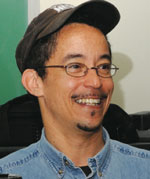 Charles Lewis had no aspirations for a newspaper career when he enrolled at SUNY Fredonia in the mid-1980s, but numerous learning experiences and opportunities to pursue his passion through the campus became the springboard to a successful career in photojournalism.
Charles Lewis had no aspirations for a newspaper career when he enrolled at SUNY Fredonia in the mid-1980s, but numerous learning experiences and opportunities to pursue his passion through the campus became the springboard to a successful career in photojournalism.
Beginning as a Music major, he joined the radio station, switched his major to Communication and ultimately to English. “I just kind of fell into English; as I tried different things, I always took English classes and did well, and I was always pretty strong in writing,” Lewis remembers. “It seemed to be the best fit for me.”
A camera in hand was a good fit, too. Lewis took a photography course and began shooting for The Leader and yearbook. Assignments at rallies, concerts and sporting events brought Lewis into contact with Elmer Haas, who shot for the Observer in Dunkirk.
“He was really passionate about photojournalism and loved to talk about photography,” Lewis said. “And I thought, ‘Wow. That is a great way to make a living.’”
Following graduation, Lewis became a staff photographer at The Post-Journal in Jamestown, and later worked at the Observer. Big-circulation markets followed, first at The Patriot-News in Harrisburg, Pa., and then The Buffalo News, where he’s been for the last 13 years.
“I made good connections at Fredonia and got valuable support from the faculty,” he said, pointing to Communication professors Ted Schwalbe and Dan Berggren, as well as English professors James Shokoff, Malcolm “Mac” Nelson, Robert Deming and Karen Mills-Courts as key influencers.
“The breadth of experiences that I got at Fredonia was what I found most useful,” he explained. “One of the things that I found really helps me in doing my job is I was always interested in a whole variety of things – and I really got to experience a variety of things at Fredonia.”
He was initially skeptical of digital cameras, but now says they give him more time to shoot in the field. His advice to today’s students is simple: “Embrace all the new technology.”
At the conference, Lewis presented his portfolio, explained how he approaches assignments and offered tips on composition, focal lengths and equipment.
Vic Baker, Senior Producer, WIVB-TV/Channel 4
 Vic Baker, a senior producer at WIVB-TV (Channel 4) in Buffalo, N.Y., already had some seasoning as a reporter when he arrived at SUNY Fredonia in 1969, but critical-thinking skills he refined as a Philosophy major have served him well in a broadcast journalism career still going strong.
Vic Baker, a senior producer at WIVB-TV (Channel 4) in Buffalo, N.Y., already had some seasoning as a reporter when he arrived at SUNY Fredonia in 1969, but critical-thinking skills he refined as a Philosophy major have served him well in a broadcast journalism career still going strong.
Philosophy is not so much a subject as it is the pursuit of excellence in wisdom, Baker explained. “We need to be analytical thinkers – not taking things at face value, but probing deep, and the training that I received here helped me tremendously.” Baker was challenged by teachers, such as Dr. Marvin Kohl, to formulate well-reasoned, powerful essays.
SUNY Fredonia didn’t have a formal communication program in the early 1970s, but Baker says the school allowed him to craft an independent study tract that sharpened his documentary and filmmaking skills. He had written radio newscasts and was a newspaper stringer in high school. He quickly immersed himself on campus in the news business through key editorial positions at The Leader and WCVF radio.
It was through WCVF that Baker attended an Associated Press convention and “hooked up” with WIVB as a stringer, which led to scene coverage of severe storm damage and devastating floods from Hurricane Agnes along the Southern Tier in 1972. He later became news director of WDOE radio in Dunkirk and a stringer for The Buffalo Evening News before joining Channel 4 as a full-time reporter in 1975. He’s produced its 6 p.m. news since 1977.
A Hornell, N.Y., native and member of the Buffalo Broadcasters Hall of Fame, he has witnessed earth-shaking changes in the ways news is gathered, presented and consumed. Images once recorded on 16mm film can now be delivered instantly to the consumer by the reporter in the field. “No more ‘film at 11;’ if it happens now, they expect it now.”
Even with technological advances, Baker emphasized the importance of having a firm grounding in classic literature, western civilization, economics, politics, and the Declaration of Independence and U.S. Constitution. “These are the concepts and the disciplines you need to be good journalists,” he told students.
Joanna Pasceri, Co-anchor, WKBW-TV/Channel 7
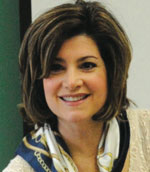 Joanna Pasceri is one of the most widely recognized Fredonians in Western New York. As the co-anchor of WKBW-TV/Channel 7’s 5 p.m., 6 p.m. and 11 p.m. newscasts, she’s been in the family rooms of many of the region’s 1.5 million residents every night for the last 15 years – a dream-come-true for this Lockport, N.Y., native.
Joanna Pasceri is one of the most widely recognized Fredonians in Western New York. As the co-anchor of WKBW-TV/Channel 7’s 5 p.m., 6 p.m. and 11 p.m. newscasts, she’s been in the family rooms of many of the region’s 1.5 million residents every night for the last 15 years – a dream-come-true for this Lockport, N.Y., native.
“I feel really lucky that I was able to do pretty much everything close to home,” said Ms. Pasceri.
By high school, Joanna knew she wanted to be a journalist. “My favorite TV show growing up was ‘Lou Grant,’” she admitted. However, Fredonia helped this 1987 Communication graduate realize her calling wasn’t in newspapers, but television.
Fredonia had a strong broadcast communication program and great internships, including an opportunity in Washington, D.C., which allowed her to work at an independent TV news bureau on Capitol Hill.
“It was a small operation but they had some great professionals who really took me under their wings,” she explained. “That’s what helped me break into this business,” which she did just three months after earning her bachelor’s degree when she was hired by WETM-TV in Elmira, N.Y.
Still, she missed her home town, and when an opportunity came along for her to move back home, she jumped at the chance.
She was hired as a producer with WKBW in 1993, promoted to reporter/anchor in 1997, and ascended to her current position in 2006. She earned several awards, including the Associated Press’ Best Spot
News Coverage and Best Continuing Coverage honors.
Fredonia’s reputation is well-known throughout her industry, attests Pasceri, who needs to look no further than her WKBW family for proof. She is one of six Fredonians currently at the station, including Jeff Russo, ’97 (Sports Director); Lanora Ziobrowski, ’84 (Program Manager); Meghan Erbacher, ’09 (Assignment Desk); Adam Francis, ’03 (Photojournalist), and Kevin Chudy, ’83 (Engineer).
“If that doesn’t tell you how well this college prepares you for the business, I don’t know what does,” she said. “You go to school to expand your mind, not necessarily to get a job. But it’s great when you can do both, and that’s what I think we’re doing at Fredonia. Today’s students are coming out of school qualified to work. They’re ready – and that’s rare.”
There’s a little reminder of Fredonia’s impact on her waiting at home, too – husband Richard, a 1986 Business Administration graduate, whom she met as a student.
“I’m really fortunate to do what I love in the city that means the most to me,” she acknowledged. “It’s a lesson a lot of journalists learn, and I was lucky I learned it right off the bat.”
She also shared some other lessons learned with the students. “Explore everything,” she advised. “Don’t be narrow minded and just stick to what you know.”
She also stressed the value of each person’s individuality. “There will always be somebody smarter or prettier than you, but there is only one ‘you.’ You have to make the most of you.”
Jeff Woodard, News Director, WGRZ-TV/Channel 2
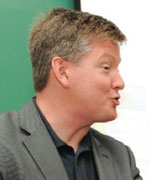 Recently, Jeff Woodard found himself in an unusual position. Instead of directing the news, he was the news. For weeks, media around the world had been reporting on a “mysterious illness” affecting a dozen teenage girls in LeRoy, N.Y., a small town in between Buffalo and Rochester. The patients exhibited a series of nervous twitches and tics, drawing the attention of all the major networks, The New York Times – even environmentalist Erin Brockovich.
Recently, Jeff Woodard found himself in an unusual position. Instead of directing the news, he was the news. For weeks, media around the world had been reporting on a “mysterious illness” affecting a dozen teenage girls in LeRoy, N.Y., a small town in between Buffalo and Rochester. The patients exhibited a series of nervous twitches and tics, drawing the attention of all the major networks, The New York Times – even environmentalist Erin Brockovich.
Doctors diagnosed it as Conversion Disorder, a psychological condition, adding that all the media attention – including dozens of Internet videos of the girls exhibiting their symptoms – wasn’t helping. So Woodard asked his WGRZ-TV team: “What if we stopped? Couldn’t an equally good reporting job be done without showing the girls struggling?”
With his colleagues’ approval, he announced that WGRZ would no longer show footage of the girls, a decision which generated ethical debates – and much applause – on and off the air.
“We looked at where that community was,” he explained. “The kids weren’t getting better and…we realized the community could potentially get a huge benefit out of (the decision). Our mission is to serve the community, to do some good. We wanted to report the story with passion and compassion.”
Such a stance in today’s media, where deadlines and “viewer interest” often carry more weight than privacy rights, may be surprising. But if you understand Jeff’s roots, it all adds up.
Growing up, Woodard read the paper daily and liked knowing what was going on in his Finger Lakes community of Dundee, N.Y. He had a “real curiosity,” which he followed to a job at a local radio station, a two-year college and, ultimately, SUNY Fredonia.
Fredonia’s quaint setting was a perfect fit. “I fell in love the moment I saw it,” he said. “It’s a large campus, but a small one. You get the attention of your instructions whenever you want it, and there are lots of hands-on opportunities. It had everything I wanted.”
He worked for WNYF-TV and at Jamestown’s WHUG-FM, but it was The Leader, ironically, and a class he took from its advisor, Penny Deakin, which made Jeff pursue TV.
“I remember just loving that class because I had a chance to write,” he said. “That’s why I became a producer; there’s a lot more writing.”
He was hired as the morning news anchor in Jamestown after finishing school in 1995 and worked weekends in Syracuse at ABC affiliate WIXT-TV, which soon hired him full-time and allowed him to begin producing.
Woodard joined WGRZ in 1998 as the 11 p.m. producer, eventually rising to news director in 2008. Since then, WGRZ has earned the top spot in Buffalo’s top morning and early-evening news blocks. His team has won 10 Emmys and five national Edward R. Murrow awards, including the 2011 award for Overall Excellence for a “small” market.
Perhaps that’s why the LeRoy story had such an impact on him. Even today, despite working in the state’s second-largest city, he still loves a good small town. He and his wife, Brandie (Wallin), ’97, ’03, (Elementary Education) call the rural community of Eden, N.Y., home. There they raise three horses and two dogs along with their two daughters – a lifestyle he relishes.
“I love Western New York and what it represents,” he said. “I have no interest in going anywhere else.”
He hopes today’s students keep some of those values in mind as they start their careers.
“Don’t get into this if you just want to be on TV,” he advised. “But if you want to get involved in a community and make a difference, there are still jobs in this business for people like that.”

